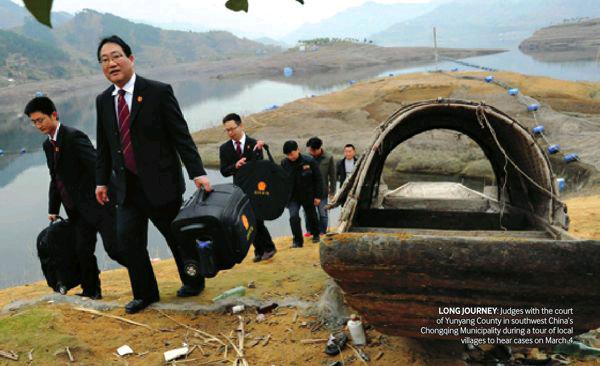Bare Benches
2014-05-08ByyinPumin
By+yin+Pumin
on March 12, Zhang Xuequn, President of the Higher Peoples Court of yunnan Province and a deputy to the 12th National Peoples Congress (NPC), Chinas top legislature, proposed raising judges salaries during a panel discussion of this years NPC full session. Zhang said that he hopes the move could boost judges morale and increase their enthusiasm for work.
The proposal is a response to the fact that a growing number of judges have left their positions in recent years, putting increasing pressure on the countrys judicial system.
According to Mu Ping, President of the Higher Peoples Court of Beijing and also a deputy to the 12th NPC, more than 500 judges have resigned in Beijing over the past five years.“Many of them chose to become lawyers and others have gone on to government offices and enterprises,” Mu said. “It is a great loss to the courts, because most of these judges have a lot of experience.”
Mu cited the high pressure work environment, as well as the lack of competitive salaries and promotion opportunities, as the main causes. “We should work out solutions to this problem, creating favorable working conditions for judges and bolstering their sense of professional pride,” he said.
A burdensome job
Early in May last year, a report issued by Beijingbased Renmin University of China revealed the problem of the loss of judges in primary-level courts.
Peng Xiaolong, an associate professor at the universitys Law School and a major contributor to the report, said that the situation has become serious and posed a threat to the daily operation of primary-level courts. “With the development of society and the increasing legal awareness among ordinary citizens, more lawsuits are being filed at primary-level courts, greatly increasing their judges workloads,” Peng said.
The report said that the number of judges in China has tripled to 196,000 over the past 30 years, while the number of lawsuits each judge settles annually has jumped 13-fold.
Meanwhile, according to the Supreme Peoples Court, Chinas highest judicial organ, 5 percent of judges have quit their jobs before reaching the retirement age over the past 30 years.
Zhou Haibo, an NPC deputy from south Chinas Guangdong Province, confirmed the reports findings. His research shows that the number of cases handled by courts in Qingyuan, a small city in Guangdong, increased by 52.7 percent from 2008 to 2012, but the number of local judges and court staff dropped by about 8 percent.endprint
“An ex-judge told me that she quit her job because she did not have enough time to spend with her kids on account of heavy workloads,” Zhou said.
Lin Hui, a lawyer from Shenzhen in Guangdong, said that her office is located beside a court so she frequently sees court employees working late.
The situation in central Chinas Henan Province is the same. According to Song Xiaoxin, Director of the Political Department of the yicheng District Peoples Court in Zhumadian City, the 31 judges in the court handled 3,292 civil cases in 2013, representing an average of 106 cases each.
Li Liuzhu is a judge at the yicheng Court. According to him, he handled more than 130 cases last year. “I have worked at the court for 25 years. During my time, the most impressive thing I have witnessed is that the number of lawsuits keeps growing each year,” Li said.
According to Li, in spite of rising workloads, there has been no corresponding increase in salaries. Lis salary is 3,110 yuan ($501) per month currently. “I cannot say the salary is not enough for me but it is fairly low compared to the burden,” Li said.
In Shanghai, low incomes coupled with long working hours prompted 74 judges in primary-level courts to leave their posts in 2013, according to Cui yadong, President of the Higher Peoples Court of Shanghai.
“While they often work into the night, many young judges fail to afford an apartment in Shanghai,” Cui told a group of national legislators during this years NPC session.
On top of poor living conditions, the workloads are excessive, according to legislator Li Biying, with each judge in Shanghai handling an average of 131 cases over the past year. That translates into one case every two working days.
“I hope the central authorities can raise judges salaries in the near future,” said Li Liuzhu with the yicheng court.
Professional management
Besides rising workloads and low salaries, experts and insiders also point out the problem with the outdated management model for the countrys judges, and suggest more innovation could reinvigorate the system.
Peng at the Renmin University of Chinas Law School believes the current management system, which treats judges the same as other civil servants, exerts a negative influence on the performance of judges.
“This model neglects the special character and need for autonomy for judges, creating obstacles for them during trials involving other government agencies or officials,” Peng said.endprint
Zhou from Guangdong agreed with Peng. In his proposal submitted to the NPC, Zhou said that the current management of judges affects the efficiency and independent jurisdiction of courts.
Zhou said that since Chinese judges are now under the same assessment and promotion system as civil servants, many judges are inclined to seek promotion through methods other than perfecting their professional performance. “Instead of being a good judge, they may prefer to be a resourceful official,” he wrote in the proposal.
In addition to this, since the budget of courts and promotion of judges are linked with the government at the same level, independent jurisdiction has been affected, Zhou complained.
Meanwhile, Zhu Zhengxu, also an NPC deputy and a judge from Baofeng County in Henan, said that the current personnel management system also limited judges promotion opportunities.
According to the Supreme Peoples Court, the current system divides judges into several grades, with the highest being the chief judge and the lowest being a “grade-five” judge. Above grade-one judges are a number of higher senior positions.
Zhu said that under the model, a judge, starting with assistant judges, could reach the rank of grade five within seven years, under the condition that he or she committed no wrongdoings.
However, there is another regulation stipulating that in a county-level court, only its president can be a senior judge and all other judges can reach grade one at the highest. “That means a judge will have no chance of being promoted further before retirement if he or she does not leave that court,” she said.
Zhu Jingwen, another professor at the Renmin University of Chinas Law School, said that the situation is perpetuated by the fact that the current management system for judges is indiscriminately covered by the countrys administrative management system. He suggests establishing an independent management system for judges.
“Judges are different from other civil servants. They hold a special profession, so they need a professional management system to guard their special honors and ensure independence,” Zhu said.
Peng agrees that the management system for judges should respect the rules of their judicial work. “Creating sound systems to stipulate admittance, retirement, promotion, education, performance evaluation, as well as reward and punishment for the judges will all be important tasks in reforming the judicial personnel management system,” he said.
Showing concern for the issue, the Organization Department of the Communist Party of China Central Committee and the Supreme Peoples Court issued a regulation together in March last year, saying that they will make a separate management system for judicial workers.
Peng suggests the central authorities integrate current regulations to make a single regulatory document for regulating management of judges. “Currently, except for the Judges Law, other stipulations concerning judge management are scattered in different regulatory documents, which creates difficulties,”Peng said.
Meanwhile, Zhu has advised control over the number of lawsuits handled by communitylevel courts, under the condition that judges are in shortage. He suggests diverting less urgent cases to local mediation agencies to ease the burden on these judges.
“It is harder for a judge to ensure justice when he or she is under pressure,” Zhu said.endprint
